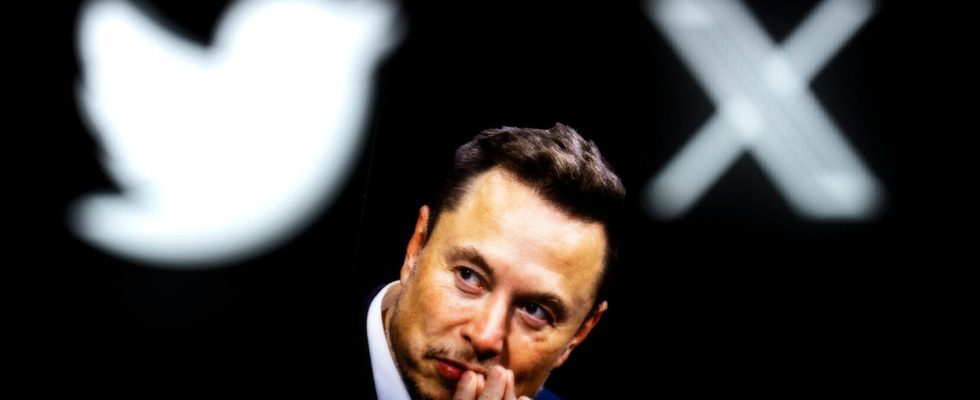Social media
Because of the Israel war: EU takes on Elon Musk’s Twitter
Elon Musk bought Twitter almost a year ago and has since renamed it X
© NurPhoto / Imago Images
For days, X/Twitter has been criticized for its handling of the Israel war. The EU has now officially started an investigation. It could be expensive for the short message service.
In fast-moving news situations like the Hamas attack on Israel, social media is often a good way to stay up to date. But speed poses risks when dealing with false reports or, in particular, drastic content. This now threatens to have consequences for X, formerly Twitter. The The EU has officially begun investigations into the short message service.
The EU has sent the company a so-called request for information, which must be answered by next week. What sounds harmless could have expensive consequences for X: The request is based on the Digital Services Act that came into force in August. If the questions are not answered or are answered inadequately, the EU can decide on harsh consequences: the law provides for penalties of up to six percent of the previous year’s turnover.
Investigation against X
Specifically, it concerns how the platform deals with disinformation and material that is illegal in the EU. In the past few days, countless false reports have been spread on X, such as that the Israeli army destroyed one of the oldest Christian churches in the world. But the sometimes extremely cruel violent videos could also be a problem.
The fact that the investigation is coming should actually come as no surprise to the company’s management. On Tuesday, EU Commissioner Thierry Breton asked the company to comment and set a deadline of 24 hours. X owner Elon Musk reacted, but repeatedly appeared clueless about what Breton wanted from him. It was only on Thursday that Linda Yaccarino, appointed by Musk, responded to the request with an open letter. But this was apparently not enough for the EU: a few hours later, the company received the request for information.
Paypal, Tesla, SpaceX
Elon Musk: His companies, his family – the richest person in the world in pictures
Clear questions, vague answers
The war in Israel is becoming a testing ground for the new Internet law. The law, known as DSA for short – Digital Services Act – is intended to ensure greater security for EU citizens in the digital space. The platform operators are obliged to remove illegal content in the EU, reduce risks to public safety through the platforms and ensure a functioning civil discourse.
With regard to the Israel conflict, the EU now wants to know from X what precautions have been taken in the event of a crisis like this and what protocols there are for dealing with false information such as manipulated images and videos from the war. The deadline for answering questions about the crisis protocol is October 18th; X can submit the remaining information by the end of the month. The EU explained that they would then consider further steps.
Yaccarino’s answers were apparently not enough for the EU. On the three pages, the X boss appointed by Musk explains that they have blocked propaganda accounts, are taking action against the sharing of illegal content and are reducing the visibility of posts that are drastic but legal. However, she does not explain how exactly and according to what criteria this happens.
Facebook and Tiktok also have to respond
But Twitter is not the only company that the EU is keeping an eye on because of the current situation. Facebook’s parent company Meta was also asked by Breton on Wednesday to comment on its handling of this content on its own platforms. A request to Tiktok followed on Thursday. Here too, Meta set a deadline of 24 hours.
Meta has already reacted and, unlike X, listed its actions in detail. For example, the group set up a special working group, which consists of some Arabic and Hebrew-speaking experts, works with fact checkers and was able to name very specific measures in order to be able to effectively manage the special situation.
Homemade problem
The fact that X finds such a reaction more difficult is probably due not least to Elon Musk. He sees himself as a “freedom of expression absolutist,” as he emphasized several times. While Twitter regularly deleted content itself before the takeover and took independent action against hate speech and disinformation on the platform, Musk always viewed this as censorship. Musk also reacted defiantly to Breton’s first request and demanded that concrete examples be given publicly. “We don’t work in the back room here,” he said to the EU Commissioner.
In fact, Musk’s austerity measures are likely to play a significant role in the current problem of dealing with disinformation. Under his leadership, jobs at Twitter were drastically cut and the entire team was thrown out to fight misinformation. This cost-cutting measure could now be expensive for X.
Sources: EU Commission, Reuters, X, Meta


